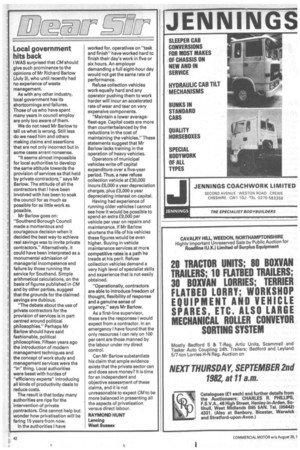Local government hits back
Page 36

If you've noticed an error in this article please click here to report it so we can fix it.
I WAS surprised that CM should give such prominence to the opinions of Mr Richard Barlow (July 3), who until recently had no experience of waste management.
As with any other industry, local government has its shortcomings and failures. Those of us who have spent many years in council employ are only too aware of them.
We do not need Mr Barlow to tell us what is wrong. Still less do we need him and others making claims and assertions that are not only incorrect but in some cases arrant nonsense, "It seems almost impossible for local authorities to develop the same attitude towards the provision of services as that held by private contractors," says Mr Barlow. The attitude of all the contractors that I have been involved with has been to soak the council for as much as possible for as little work as possible.
Mr Barlow goes on: "Southend Borough Council made a momentous and courageous decision when it decided the best way to achieve real savings was to invite private contractors." Alternatively, it could have been interpreted as a monumental admission of managerial incompetence and failure by those running the service for Southend. Simple arithmetical calculations, on the basis of figures published in CM and by other parties, suggest that the grounds for the claimed savings are dubious.
"The debate about the use of private contractors for the provision of services is in part centred around political philosophies." Perhaps Mr Barlow should have said fashionable, political philosophies. Fifteen years ago the introduction of modern management techniques and the concept of work study and management services were the "in" thing. Local authorities were beset with hordes of "efficiency experts" introducing all kinds of productivity deals to reduce costs.
The result is that today many authorities are ripe for the intervention of private contractors. One cannot help but wonder how privatisation will be faring 15 years from now.
In the authorities I have worked for, operatives on "task and finish" have worked hard to finish their day's work in five or six hours. An employer demanding a full eight-hour day would not get the same rate of performance.
Refuse collection vehicles work equally hard and any operator pushing them to work harder will incur an accelerated rate of wear and tear on very expensive components.
"Maintain a lower averagefleet-age. Capital costs are more than counterbalanced by the reductions in the cost of maintaining the vehicles." These statements suggest that Mr Barlow lacks training in the operation of heavy vehicles.
Operators of municipal vehicles write off capital expenditure over a five-year period. Thus, a new refuse collection vehicle at £30,000 incurs £6,000 a year depreciation charges, plus E3,000 a year depreciating interest on capital.
Having had experience of running older vehicles I cannot see how it would be possible to spend an extra £9,000 per vehicle per year on repairs and maintenance. If Mr Barlow shortens the life of his vehicles these figures would be even higher. Buying in vehicle maintenance services at more competitive rates is a path he treads at his peril. Refuse collection vehicles demand a very high level of specialist skills and experience that is not easily obtained.
"Operationally, contractors are able to introduce freedom of thought, flexibility of response and a genuine sense of urgency," says Mr Barlow.
As a first-line supervisor, these are the responses I would expect from a contractor. In an emergency I have found that the only resources I can rely on 100 per cent are those manned by the labour under my direct control.
Can Mr Barlow substantiate his claim that ample evidence exists that the private sector can and does save money? It is time for an independent arid objective assessment of these claims, and it is not unreasonable to expect CM to be more balanced in presenting all the aspects of privatisation versus direct labour.
RAYMOND HUNT Lancing West Sussex








































